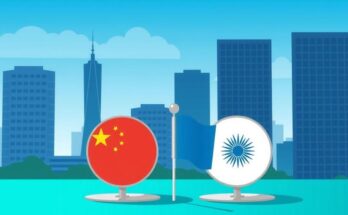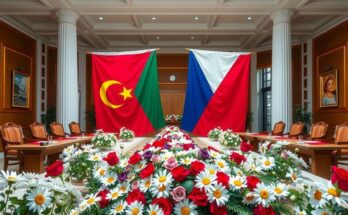Rwanda’s ascent on the global stage has led to diminished international pressure as the M23 rebels advance in eastern Congo. The contrast in responses compared to 2012 reflects Rwanda’s enhanced military and economic significance, alongside its strategic partnerships. Despite embracing extensive foreign aid, the international community remains hesitant to impose strict measures against Rwanda, complicating diplomatic dynamics in the region.
Rwanda’s increasing prominence on the global stage has led to less vociferous international condemnation as the M23 rebels advance through eastern Congo. Following the capture of the vital city of Goma by Rwanda-backed M23 forces, the United Nations and several Western nations, including the U.S., France, and the U.K., issued statements denouncing Rwanda. However, the lack of substantial financial pressure on Kigali signals a shift compared to the previous instance in 2012.
The difference in the international community’s response is largely attributed to President Paul Kagame’s successes in transforming Rwanda into a model of political stability and economic growth in the aftermath of the genocide. Analysts argue that Rwanda’s military and economic contributions have made Western nations hesitant to impose strict measures against the country, despite its long-standing support for armed groups like M23. Notably, Rwanda continues to rely on significant foreign aid from countries like the United States and the European Union.
In contrast to 2012, when millions in aid were withheld as leverage, the current geopolitical landscape has lessened the pressure on Rwanda. Decreasing military aid options since 2012 have diminished the West’s ability to exert influence. Additionally, Kagame’s administration has successfully bolstered relationships with non-Western powers, firmly positioning Rwanda as indispensable in regional security and peacekeeping.
Rwanda’s emergence as a key player in the export of critical minerals—particularly tantalum, essential for semiconductor manufacturing—has attracted the attention of Western nations competing with China for access to resources in the region. Despite controversies regarding mineral sourcing from eastern Congo, the European Union’s agreement to import minerals from Rwanda marks a significant step in economic partnership, revealing that concerns over human rights and conflict have not deterred advancement toward economic collaboration.
As tensions rise with the M23’s advances, Rwanda’s strategic alliances and economic transformations complicate international responses, making decisive action from Western powers increasingly unlikely. The contemporary international landscape reveals a complex web of diplomacy where the influence of Rwanda continues to grow, affecting regional dynamics and humanitarian efforts within eastern Congo.
The article examines Rwanda’s evolving political and economic stature in the context of its military actions in eastern Congo, specifically the resurgence of the M23 rebel group. International reactions from the U.N. and Western nations have been muted compared to past conflicts, highlighting changes in Rwanda’s geopolitical relevance and the global power dynamics at play. Rwanda’s significant foreign aid dependency and strategic military contributions to peacekeeping operations add to the complexities of international diplomatic relations and responses to conflict in the region.
In conclusion, Rwanda’s strengthened global position diminishes the effectiveness of traditional diplomatic pressures that once compelled decisive action. The combination of Kagame’s strategic governance and economic achievements complicate Western response options regarding Rwanda’s involvement in the M23 conflict. As Rwanda continues to rebrand itself as a crucial economic and military partner, the international community’s ability to influence its actions is increasingly limited.
Original Source: apnews.com




